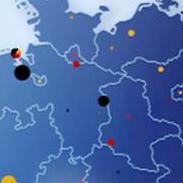On the eve of the September 22, 2013 parliamentary elections in Germany, I asked some German colleagues whether the already-finished campaign had any effect on German’s foreign policy, particularly regarding Russia and Eastern Europe.
[[{“type”:”media”,”view_mode”:”media_large”,”fid”:”1670″,”attributes”:{“alt”:””,”class”:”media-image”,”height”:”183″,”style”:”width: 183px; height: 183px; float: left; margin-left: 3px; margin-right: 3px;”,”typeof”:”foaf:Image”,”width”:”183″}}]]Barbara von Freitag, adviser to German MP Andreas Schockenhoff, thinks that, unfortunately, “after an intense debate on relations with Russia throughout the year, this electoral campaign had no foreign policy focus at all. All major foreign policy issues were evaded, including Ostpolitik. Therefore, the election debate had no effect on the foreign policy of Germany. Even with Russia back in world diplomacy there is no debate on how to use the new dynamics for signing new Association Agreements, developing Eastern Partnerships, or promoting conflict resolution in the common neighborhood. Füle’s speech on Russian pressure on Eastern Partnership countries went completely unnoticed in German media.” (Štefan Füle is the EU Commissioner for enlargement and neighborhood policies.)
Stefan Meister, European Council on Foreign Relations in Berlin, deems that “the campaign had at least one effect: Merkel became more critical and consistent about Putin’s Russia – something than would not have been possible without public pressure. Yet for Merkel (like for Obama) being more consequent on human right issues toward Russia brings little benefit, if any. By the same token, all foreign policy issues played only a limited role in the campaign – even Syria was not a big issue, let alone Russia.”
Joerg Forbrig, Director of the Fund for Belarus Democracy at the German Marshall Fund, avers that “not surprisingly, and much as would be the case in any other country, it is primarily domestic and EU issues dominated the election campaign in Germany. By contrast, relationships with Russia did not figure at all in the debates, although most major parties make reference to Russia in their detailed programmes. The formulations there also shed some light on how individual parties, if ending up forming the new government, would handle German-Russian relations. Thus, the CDU stresses that the ‘depth and breadth of these relations depends on the extent to which Russia lives up to its international commitments to the rule of law and democratic standards,’ while the SPD formulates vaguely a ‘policy that combines economic co-operation, political and societal dialog in a comprehensive modernisation partnership.’ The Greens submerge Russia with Europe's neighbourhood to the East and South where they demand that the EU should support democratic reforms and human rights, supported by a liberalisation of visa regimes. The FDP is perhaps most critical in ‘observing limitations of civic rights by the Russian government and justice system’ and stresses that ‘co-operation with Russia is not in contradiction with an open and critical dialogue.’"
“These nuances,” Forbrig continues, “will likely become more pronounced as parties, depending on the result of elections and coalition talks, will be in government or opposition. Impulses for political actors to define their positions more clearly will likely stem from a number of sources. One, for several months now, Germany has seen a heated debate about its foreign policy strategy. The two broad poles of this debate are an explicit commitment to a value-based foreign policy on the one hand, and a sort of Realpolitik that puts German economic interests above all. The latter position appears to weaken, and the former to strengthen, with likely effects for German-Russian relations. Two, an important task for the next government will be initiatives to rebuild Europe in a way that makes the EU more functional and sustainable. An item of this agenda is further enlargement and engagement with the EU neighbourhood, both South and East. Here, Russian plans for Eurasian integration are on a direct collision course with the European perspective for Eastern neighbours. The pressure that is increasingly exerted on its near abroad by the Kremlin will likely force Brussels, and Berlin with it, to become more proactive. Three, while Russia is an important trade partner for Germany, it has for years hovered around 4 percent of German foreign trade (on par with countries like Belgium or Poland). Even worse, prospects for stronger economic ties are dim. This has been acknowledged by now by the German political class, with exceptions perhaps, and lowered the threshold for voicing criticism of Russia, its domestic developments, treatment of neighbours, and conduct on the global stage.”
Yet Ukraine was a different case in the campaign, as Inna Melnykovska, University of Giessen/Freie Universität Berlin, opined, “Initially, Berlin’s Ostpolitik did not figure high in the pre-election debates in Germany and was limited to Russia. The parties’ visions of future Ostpolitik were limited to the scenarios of German relations with Russia. Overall, all parties ignored the frozen situation in Russia-EU relations and pled for enhanced cooperation between two countries, as well as favored increased Russian involvement in the existing global governance structures. The concentration of German parties’ campaigns on Russia warmed up the traditional Ukrainian perception of German Ostpolitik as such that is based on geopolitical considerations and that follows a ‘Russia first, Ukraine second’ approach.”
Melnykovska continued, saying that the upcoming Eastern Partnership Summit of the EU in Vilnius made Berlin broaden the scope of its Ostpolitik. Especially topical were debates on prospects of the Association Agreement (AA) between the EU and Ukraine. The rhetoric of German officials on the readiness of Ukrainian authorities to sign the AA was values-loaded, with reforms in Ukraine’s juridical system as the key condition where the German government saw no room for compromise. Thereby, Tymoshenko’s case was highlighted as symbolic for selective justice in Ukraine. However, instead of holding on to Tymoshenko’s case as a reason not to sign the AA with Ukraine (as it was at the NATO Bucharest summit in 2008 when Germany practically vetoed NATO’s Membership Action Plan for Ukraine due to the democratic deficits of Kuchma’s regime), this time the German government seemed to put efforts to solve Tymoshenko’s issue and enable the signature of the AA. During his visit to Kyiv, the foreign minister of Germany, Guido Westerwelle, officially offered Ukrainian authorities a solution: Tymoshenko should be allowed to have adequate medical treatment in Berlin’s Charite hospital. Ukrainian officials did not follow through on this offer immediately, though many Ukrainian observers regard this solution as most acceptable for president Yanukovych and thus most probable to happen.
Berlin’s values-loaded Ostpolitik suffers from low credibility. Ukrainian authorities interpret the values-loaded rhetoric as such that is more directed to the German population than to Ukrainian authorities. Ukrainian officials regard Germany (apart from Poland) as a strong supporter of the AA with Ukraine. Some Ukrainian observers even speculate that leaving Tymoshenko’s case unsolved a few weeks before the Eastern Partnership Summit in Vilnius is a strategic maneuver, as Ukrainian authorities expect Berlin to be more ready to compromise and be satisfied with any sign of reform progress after the parliamentary elections in Germany are hold. Russia’s recent trade wars against Ukraine, Moldova, and Latvia, as well as Russia’s pressure on Armenia, are expected to further support German (and the EU’s) readiness to compromise values for the sake of geopolitical considerations.
Despite the pro-presidential parliamentary majority, the Ukrainian government has only recently pressed the bulk of the pro-EU laws necessary to sign the AA through the Ukrainian parliament. Still, the most sensitive issues to Yanukovych’s regime, a law establishing a prosecutor's office as well as new laws on the police and on an independent bureau of investigation, are not (yet) discussed in the parliament. Ukrainian authorities provided some signs of reform progress to European politicians, possibly calculating that these signs might be enough to sign the AA in the face of Russia’s geopolitical pressure. Furthermore, the fast-track adoption of pro-EU legislature does not guarantee that Ukraine’s practice of making declaration without implementation could be eliminated. Ukrainian authorities could keep the room for maneuver even after the AA would be potentially signed.
Melnikovska's analysis concludes that Berlin’s “beyond-Russia values-loaded Ostpolitik” has a chance to became more credible and eventually more effective only if it is long-term and not limited to election campaigning.
Andrey Makarychev is a professor at the Institute of Government and Politics, University of Tartu, blogging for PONARS Eurasia on the Russia-EU neighborhood.











